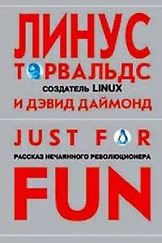"We arrive at her mother's first-floor apartment and Anna Torvalds is thrilled to see us. Mikke is her nickname. She refuses tolet me indulge in the Finnish custom of removing one's shoes: "Don't be silly. This place is already dusty. You couldn't possibly make it worse." She is short, dark-haired, and extremely quick-witted. Within seconds of our arrival, the telephone rings. A real estate agent wants to show me the vacant apartment adjacent to Mikke's, so that I could describe it to her son in the United States and hand-deliver literature about it, in the event that he might want to purchase the place as a sort of Helsinki pied-a-terre. We enter the sprawling apartment, where the agent, who bears an eerie resemblance to the Annette Bening character in the film American Beauty , instructs us to slip little blue cloth booties over our shoes before we take the tour. Soon the agent, in an annoyingly cheerful tone, says something like, "Now this room here. It's a perfect room for antiques that you wouldn't want to have damaged by the sun." Mikke shoots me a conspiratorial glance and replies, in a mocking voice: "OH, what a delightful way of telling us this room doesn't get any light. "
Back in her own kitchen, Mikke sits at a rectangular table bearing a colorful tablecloth and pours coffee into an oversized mug. Her apartment, like that of her ex-husband, brims with books and folk art. There are black and white Marimekko curtains. The apartment originally contained three bedrooms and a kitchen. When her children moved out, Mikke moved into the large bedroom that had been occupied by Sara. She then dismantled the walls around Linus's room, and those around her original bedroom, to create a huge livingroom/kitchen. She points to a vacant spot and says, "That's where his computer was. I guess I should put up some sort of plaque. What do you think?" She chains smokes. She is an easy conversationalist, with such a solid command of English that there are no pauses when she delivers a phrase like, "He's not some random shmuck you meet on the street. " On the wall in her bedroom is a huge Soviet flag. It was a gift to Linus from Jouko Vierumaki, who had bought it during an international ski-jump competition. Linus had kept it in a drawer for years, but Mikke hung it above her bed.
Mikke pulls out an album containing the family's few photographs. There's Linus at the age of two or three, naked on the beach. There's Linus, at the same age, shooting a moon outside a famous castle near Helsinki. There's Linus as an early adolescent, looking thin and awkward. There's Mikke at a sixtieth birthday party for her statistics professor father. She points out her older sister and brother. "She's a New York psychiatrist. He's a nuclear physicist. And me, I'm the black sheep. Right? But I had the first grandchild," she declares, then lights a Gauloises.
We eat lunch at a restaurant named for Wilt Chamberlain. Sara consults her mobile phone while Mikke orders multiple espressos. Mikke recalls 'the wayshe andNicke argued over whether Linus should or should not be forced to give up his pacifier: they wrote notes to each other and left them on the counter. There is talk about Linus's poor memory and his inability to remember faces. "If you're watching a movie with him and the hero changes his shirt from red to yellow, Linus will ask, 'Who is this guy?' " says Sara. There is talk about a family biking/camping vacation to Sweden. Sleeping on the overnight ferry. Having Sara's bicycle stolen the first day. Spending the budget on a new bicycle. Erecting the tent on a cliff. Leaving Linus inside to read all day while mother and daughter swam and fished. And then, after a powerful windstorm blew in, realizing that the only thing preventing the tent from being whisked into the Baltic Sea was Linus, who had been sleeping inside, oblivious to the extreme change in weather.
Mikke laughs as she relives the years in which Linus hid in his room, slaving away on a computer. "Nicke kept saying to me, 'Kick him out, make him get a job,' but Linus wasn't bothering me. He didn't require much. And whatever it was he was doing with his computer, that was his business, his thing, and he had a right to do it. I had no idea what it was all about."
Now she is as current as anyone on her son's activities. Mikke and the other family members are on the receiving end of a continual barrage of media queries. Those requests are forwarded to Linus, who typically responds by telling his mother, father, or sister to use their own judgment when answering. But after they write a response, they generally forward it to Linus for his approval before sending it on to the reporter.
Months earlier, when I emailed Mikke requesting her recollections of Linus's childhood, her response was lengthy and well-crafted. She titled her essay, "On Raising Linus from a Very Small Nerd." In it, she recounted her early observations that her toddler son showed the same signs of scientific determination she saw in her father and older brother:
"When you see a person whose eyes glaze over when a problem presents itself or continues to bug him or her, who then does not hear you talking, who fails to answer any simple question, who becomes totally engrossed in the activity at hand, who is ready to forego food and sleep in the process of working out a solution, and who does not give up. Ever. He --or she, of course -- maybe interrupted, and in the course of daily life often is, but blithely carries on later, single-mindedly. Then you know."
She wrote about the sibling rivalry between Linus and Sara, and about the irreconcilable differences. (Sara: "I don't LIKE the taste of mushrooms/liver/whatever." Linus: "YES YOU DO!") And the grudging respect. "Linus once expressed his awe of his sister very succinctly at an early age. He might have been five or seven or whatever, when he very seriously to ldme: 'You see. I don't think any new thoughts. I think thoughts that other people have thought, and I rearrange them. But Sara, she thinks thoughts that never were before.' "
These reminiscences may reveal that I still don't think Linus has any 'special' talent and certainly not 'for computers' -- if it weren't that, it would be something else. In another day and age he would focus on some different challenge, and I think he will. (What I mean is, I hope he won't be stuck in Linux maintenance forever). For he is, I think, motivated not by 'computers,' and certainly not by fame or riches, but by honest curiosity and a wish to conquer difficulties as they arise, and to do it *the right way* because that's theway it IS and hewon't give up.
I suppose I have already answered the question of what Linus was like as a son -- easy to raise, yes. All he needed was a challenge and he did the rest. When he did start concentrating on computers as a youngster, it was even easier. As Sara and I used to say, just give Linus a spare closet with a good computer in it and feed him some dry pasta and hewill be perfectly happy.
Except . .. and this is where my heart was in my throat when he was growing up: How on Earth was he going to meet any nice girls that way? I could only once more resort to the tried and true parenting measure of keeping my fingers crossed. And lo and behold: It worked! He met Tove while teaching at the university, and when she made him forget both his cat and his computer for several days, it was immediately obvious that Nature had triumphed, as is her wont.
I only hope the Ghouls of Fame won't distract him too much. (Fame seems not to have changed him, but he has mellowed, and now tends to talk to people when they approach him. He even seems to have difficulty saying no. But I suspect it has more to do with his having become a husband and father than with all the media hullabaloo).
Читать дальше












